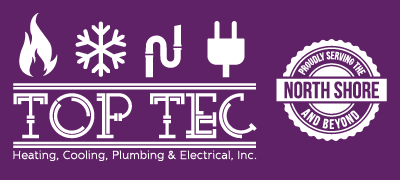
If you’re questioning whether your Libertyville house has bad indoor air quality (IAQ), it probably does.
We are indoors a lot. In fact, we’re in a building up to 90% of the time, according to the U.S. Environmental Protection Agency. And the air inside homes could be 2–5 times more contaminated than outdoors, which may create long-term health problems.
Most Common Origins of Poor IAQ
We’ve compiled a list of the most frequent causes of poor IAQ, the troubles they cause and how you can take care of these indoor air pollutants. If you’re concerned about the air inside your home, we recommend talking with a pro like TopTec about which products are best for your family.
Volatile Organic Compounds
Volatile organic compounds, or VOCs, are fumes released by regular household things.
They’re found in paint and stains in addition to:
- Furniture
- Carpet
- Building materials
- Cleaning products
- Cosmetics
- Air fresheners
- Candles
When these vapors accumulate in your home, they may irritate your eyes, nose and throat. They may also result in headaches and nausea. Regardless of whether your house is in a rural or industrial area, an EPA study found indoor levels of these chemicals can be 2–5 times greater than the air outside.
Always adhere to the manufacturer’s guidelines when painting or cleaning. Cracking a window can help fumes disperse faster.
Air purification systems can also help. This equipment partners with your heating and cooling system to freshen indoor air. When seeking one, ensure it’s specifically designed to wipe out VOCs.
Dust and Pet Dander
Dust and pet dander can irritate health problems like asthma and allergies, especially when it constantly gets redistributed by your house’s comfort system. While you can vacuum more regularly and buy an improved air filter, an air filtration system might be a better match.
This unit hooks to your comfort equipment to give powerful filtration. Some models have hospital-level filtration for getting rid of particles and bioaerosols.
Lasting Odors
New homes are tightly sealed to boost energy efficiency. While this is great for your utility bill, it’s not very good for your IAQ.
Stuffy odors can stick around for a greater amount of time because your home is pulling in a smaller amount of fresh air. Since keeping your windows open all year-round isn’t doable, here are two ways you can make your indoor air smell better.
An air purification system is placed in your ducts to wipe out odors before they are redistributed. Find one with a carbon filter and the ability to break down harmful VOCs. This equipment can also help keep your household healthy by wiping out most bacteria and normal allergy triggers like pollen and mold spores.
A ventilation system pulls out musty indoor air and exchanges it with fresh outdoor air. There are two types of equipment (heat recovery and energy recovery), so check with our professionals for more info on which kind is ideal for your house.
Unbalanced Humidity
It’s essential your residence’s humidity remains even. Air that’s too humid can create mold, while dry air can lead to respiratory concerns.
Our technicians suggest 40–50% for ideal comfort. To keep yours even, think about getting a whole-home humidifier or whole-home dehumidifier with your HVAC equipment.
Instead of having to lug a humidifier from room to room, this equipment delivers consistent humidity throughout your house.
Carbon Monoxide
Carbon monoxide is colorless gas you can’t smell. It’s caused by insufficient combustion in fuel-burning units, like gas heating systems, water heaters or fireplaces.
It causes a severe health risk. In little levels, it can cause flu-like ailments like headaches and nausea. It could be fatal in large levels.
We recommend regular furnace maintenance to double-check your system is running like it should. This job allows our pros to spot troubles before they start, including malfunctions that can create carbon monoxide leaks.
The best method to keep your residence free of carbon monoxide is to install detectors. These alarms must be on every floor close to bedrooms and living areas.
Better Your Residence’s Air Quality with the TopTec Pros
Aware that your home has poor air quality but not sure how to make it better? Or unsure which product is ideal for you? Give our friendly HVAC experts a call at 847-362-0262 or contact us online today. With free estimates and professional support, we’ll help you locate the best solution for your home and budget.
